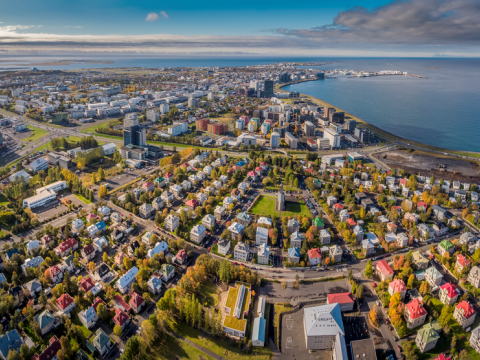
- The emergency management of the City of Reykjavík is currently operating at a crisis level and these instructions are issued in accordance with the current level of civil protection and the restrictions issued by the government.
- The main goals are to reduce services as little as possible, but maintain normal infection control in accordance with the instructions of the Directorate of Health.
- Instructions will be reassessed and updated as the government reassesses the need for restrictions and if the level of civil protection changes.
- Specific instructions relating to the activities of departments and to specific aspects of their services are published by the relevant departments.
Due to the current restrictions on gatherings from July 25 to August 13, 2021
- The number of individuals allowed in the same location is limited to 200.
- In all activities, the rule of having 1 meter between individuals must be followed, and therefore the 1-meter rule must be followed when communicating with others.
- Gathering restrictions and physical distancing does not apply to children born in 2016 and later.
- It is important to practice good personal infection prevention (wash hands, avoid unnecessary contact with one’s face, and contact other people’s faces and pay attention to general hygiene). Do not greet with a handshake and avoid hugs.
- It is important to be on the lookout for COVID-19 symptoms and get a screening test immediately if they are noticed.
- Inform the immediate supervisor immediately if a COVID-19 infection is suspected.
Use of face masks
- In general, the use of masks is not obligatory, but in cases where employees cannot ensure a 1-meter distance in their work, a mask is required.
- It is recommended for service workers to use masks, even though they can ensure the 1-meter rule.
- Employees who work in close contact with other individuals should wear masks, e.g. in care work in the field of welfare. This applies to both staff who have been vaccinated and staff who have not been vaccinated.
- Employees are encouraged to show consideration for the use of masks by others. Employees who can follow the 1-meter rule in services are asked to show understanding if the person receiving the service requests that the employee wear a mask in those circumstances.
Regarding the return of employees at the border
From midnight on Tuesday 27 July 2021, the following is valid for border screening tests according to the decision of the Minister of Health. As of that time, all vaccinated individuals or those with a confirmed previous infection who come to Iceland must present a negative Covid test, PCR, or antigen (rapid test), no older than 72 hours, when boarding abroad.
Vaccinated employees and employees who have contracted COVID-19 that are coming from abroad and are due to start work within 7 days of returning to the country should, without exception, return a negative PCR test for COVID-19 BEFORE they go to work, even though they have taken a PCR or Antigen test before arriving in the country, the test must be repeated after returning. When a screening test is requested, the symptoms experienced by the individual must be marked.
Mark the COVID-19 symptoms you are experiencing:
- Fever
- Weakness
- Cough
- Sore throat
- Cold
- Body aches
- Loss of taste or smell
- Nausea
- Diarrhea
- Headache
- According to the recommendations of the Chief Epidemiologist
If an employee is not showing any symptoms, mark According to the recommendations of the Chief Epidemiologist.
An employee can come to work as soon as a negative result comes from the screening test. However, five days after returning, employees must be especially careful and on alert for symptoms, wear a mask, and practice good personal infection prevention.
Non-vaccinated employees continue to follow government regulations and must present a PCR test certificate that is no older than 72 hours, as well as undergoing two PCR screening tests with a 5-day quarantine between testings.
The instructions of the Chief Epidemiologists say that the residents of Iceland are advised from traveling to risk areas because of the danger of infection but many countries are still considered to be risk areas because of COVID-19. Risk areas can change rapidly and different areas can be defined as such on return and departure, but the definition applies on return. An employee who, without urgent necessity, enters a defined risk area that requires them to go into quarantine when they return home is therefore considered to be in quarantine of their own choosing.
It is possible to request that an employee works from home during quarantine if the employee’s tasks are of such a nature that it is possible to work from home. This is recorded as normal working hours in Vinnustund. Otherwise, Sóttkví (e. quarantine) is registered in accordance with the employee’s own decision, and the employee must then take leave or take unpaid leave during the time they are in quarantine.
If the screening test results are positive and the employee is placed in isolation or if the employee becomes ill, the employee is registered as ill.
Reports on the infections of employees
The City of Reykjavík works in accordance with the instructions of the Chief Epidemiologist and closely with the tracing team in the event of infection among the employees of the City of Reykjavík. If an employee is infected, it is reported to colleagues. Employees who work in the same building and may have been in contact with the person in question are notified that an infection has been diagnosed in the building, but it is not specified which employee is infected. If employees suspect that they are infected, they should inform their immediate supervisor.